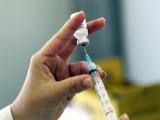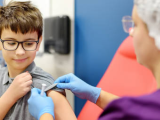A study today in JAMA Network Open reveals that several counties in north Texas have a higher incidence of human papillomavirus (HPV)-related cancers and lower HPV vaccination rates than elsewhere in the state.
And a second study published earlier this week in Frontiers in Cellular and Infection Microbiology shows that men infected with the strains of HPV associated with cervical cancer have evidence of sperm death and lower rates of fertility.
In the first study, authors compared HPV vaccination initiation and up-to-date status rates with HPV-related cancer incidence. Southern states, including Texas, have lower rates of HPV vaccine uptake, despite higher rates of cervical cancer. In Texas, an estimated 83% of HPV-related cancers are attributable to HPV infection, but the state ranks 48th in HPV vaccine series completion and 44th in HPV vaccine series initiation.
To assess the impact of these gaps in coverage, the authors compared the vaccination status of 32.3 million children and teenagers ages 9 to 17 (65.8% girls and 34.2% boys) with cancer rates in 22.5 million people aged 20 years and older (50.7% women and 49.3% men) from 2006 to 2022.
Texas ranks 48th in HPV vaccine series completion
The mean 2021 to 2022 county-level HPV vaccination series initiation estimates ranged from 6.3% to 69.1% for female and from 7.0% to 77.6% for male children and teenagers aged 9 to 17 years, the authors said. In 2022, only 16.6% of boys and 17.1% of girls aged 9 to 17 years were up to date with their HPV vaccine series.
The yearly mean age-adjusted HPV-related cancer incidence rate (IR) for 2016 to 2020 was 22.1 per 100,000 women and 14.3 per 100,000 men. Across 254 counties in the state, those in North Texas had the highest rates of cervical cancer.
"Specifically, 29 counties had high HPV-related cancer IRs [incidence rates] for both male (16.4-64.9 per 100 ,000) and female (23.8 to154.2 per 100, 000) individuals simultaneously," the authors said.
They said counties in Northern Texas are more rural and populated by anti-vaccination groups such as Texans for Vaccine Choice, which block legislation that limits vaccine exemptions.
"Additionally, in North Texas, anti-vaccination legislature is being proposed and promoted by local politicians, which has been shown to decrease the willingness of parents to have their children vaccinated against HPV,” the authors concluded.
Cervical cancer strains linked to sperm death
Childhood vaccination against HPV is recommended for both boys and girls, but boys have much lower uptake than girls. Infections caused by high-risk HPV genotypes responsible for cervical cancer, however, have detrimental effects on male fertility, according to Argentinian researchers.
In a study based on samples collected from 205 adult male volunteers who attended a single clinic for an initial fertility assessment or problems of the urinary tract between 2018 and 2021, 19% tested positive for HPV. None of the men had been vaccinated against the virus.
Among the men with HPV, those infected with high-risk (HR) strains responsible for cervical cancers had evidence of sperm death and elevated production of reactive oxygen species, which is caused by oxidative stress.
Our study raises important questions about how HR-HPV affects sperm DNA quality and what implications it has for reproduction and offspring health.
"Our study raises important questions about how HR-HPV affects sperm DNA quality and what implications it has for reproduction and offspring health. It's important to understand the biological mechanisms underlying these effects. And, given that sexually transmitted co-infections are quite common, we plan to explore whether bearing HPV infection alongside other STIs [sexually transmitted infections] influence these outcomes," said study lead author Virginia Rivero, PhD, in a press release from the Universidad Nacional de Cordoba.

















